“The one thing I am absolutely unreservedly and implacably opposed to in all of this is a real world test.” – Chris Grayling, Minister of State, Department for Work and Pensions, 2011.
By Gill Thorburn
An ongoing British government mission of ‘inclusivity’ which has sought to draw into paid employment those previously depicted as ‘excluded’ by conditions of personal circumstance, such as lone mothers, or through lack of ‘skills’ such as NEETS, or to some extent disabled and older claimants, has recently been expanded much further, venturing into territory previously delimited by, and existing under the protection of, certain ‘norms’ – that is the widespread area of sickness and disability. Characteristic of government rhetoric towards an end of ‘including’ the sick and disabled within the work-not-welfare paradigm is the adoption of an ‘abandonment’ discourse when referring to those on long-term health-related benefits (Grayling, quoted in BBC, 2011) – work being posed as their ‘salvation’.

Grayling
This is also a tacit admission by employers of the adverse conditions that prevail in the modern workplace.
This wave of inclusivity, then, has now broached an area that, until recent times, had embedded within it certain norms, which could be said to be part of a prevailing ‘humane’ discourse around sickness and disability in our society. For instance the revulsion that is held towards the German Third Reich’s euthanistic program, with its accompanying defamation of the sick and disabled, is illustrative of the sense in which that sector of the populace is acknowledged as vulnerable and deserving of support. Intrinsic to this perception is the notion that the ‘forced independence’ on this group of responsibility for their own wellbeing, through the removal of the social support it relies upon on, would be regarded as a cruelty. Further there is a sense of “there but for the grace of god…” which determines the moral values inherent in these shared norms, and a recognition that infirmity is an inevitable consequence of the aging process which touches all. It is in this sense that until recently the place of work in any ‘illness’ discourse has been marginal and tempered by notions of relevant limitations as to its positive effects.
To contravene these established compassionate norms, then, requires a compelling and strongly persuasive argument, one which is capable of overturning common sense conceptions; that work can cause further difficulties for the sick and disabled, or indeed that work has played a significant part in contributing to illness in the first place. Despite these moral inhibitions, this has now been achieved within the context of welfare policy changes around sickness and disability, and it is an argument which has emerged from a very deliberate theoretical and ideological process. This process has led to the embedding into social policy of the simple, abstract idea that “work is always good for you” (no matter what the circumstances), and has provided the ideological foundation for the implementation of the ‘medicalised bureaucracy’ of the Work Capability Assessment (WCA), administered by the government’s private sub-contractor, Atos Healthcare. The WCA is constructed as a filtering instrument by which those claiming incapacity for work can be ‘streamed’ into categories of; the “work ready”, those “having some barriers to work” and those who are “unlikely to ever be capable of working”. Increasing evidence is accumulating to the effect that this instrument is failing to be fit for purpose (Harrington, 2010; Royston, 2010; Black Triangle, 2011; After Atos; and countless other blogs, campaigns and personal accounts distributed both across the internet, and out on the street1) – unless of course that purpose is to remove welfare from the sick.
If social policies, and the associated bureaucratic procedures through which they are implemented, can be regarded as the visible front-end of government then there is also a corresponding hidden region, where the theories and ideas that lend these policies legitimacy are generated. These theoretical underpinnings are far less likely to be exposed to wider public scrutiny; rather it is accepted on trust that they have substance and arise from authoritative evidence. One set of ideas that has strongly influenced the course of recent reforms has been the deliberate attempt to formulate a ‘New Model Of Illness’ (Waddell and Aylward, 2010), one which the creators assert to be a more appropriate one than the ‘bio-medical’ model, which they claim is an outdated perspective on illness and its relationship to incapacity.
 This new approach, a ‘Biopsychosocial’ (BPS) model, originated from the work of George Engel, a trained physician who ‘converted’ from physical to psychosomatic medicine, becoming a leader in the discipline, despite his initial scepticism towards that field. Though there is no definitive text on the theory it is a simple enough concept which reveals its approach in its title. Briefly put, it is a theory that seeks to broaden the perspective on illness, by taking into account not only the biological, but also psychological and social factors which may have an influence on sickness, and consequently on the course that healing takes. The acknowledged value of this approach, when used for the benefit of the patient, is that it allows for the identification of non-biological influences which may interfere with an individual’s capacity to heal. Further indicators of the model’s intendeduse and objectives can be found in recent re-evaluations taken 25 and 30 years on. With respect to the latter, a Science Daily article (2008) describes it as having posed a ‘challenge’ to the conventional molecular biology perspective, but that it has proven effects through ‘psychotherapeutic strategies’ which facilitate coping and improve quality of life.
This new approach, a ‘Biopsychosocial’ (BPS) model, originated from the work of George Engel, a trained physician who ‘converted’ from physical to psychosomatic medicine, becoming a leader in the discipline, despite his initial scepticism towards that field. Though there is no definitive text on the theory it is a simple enough concept which reveals its approach in its title. Briefly put, it is a theory that seeks to broaden the perspective on illness, by taking into account not only the biological, but also psychological and social factors which may have an influence on sickness, and consequently on the course that healing takes. The acknowledged value of this approach, when used for the benefit of the patient, is that it allows for the identification of non-biological influences which may interfere with an individual’s capacity to heal. Further indicators of the model’s intendeduse and objectives can be found in recent re-evaluations taken 25 and 30 years on. With respect to the latter, a Science Daily article (2008) describes it as having posed a ‘challenge’ to the conventional molecular biology perspective, but that it has proven effects through ‘psychotherapeutic strategies’ which facilitate coping and improve quality of life.
Their definition portrays a model which is capable of being tailored to the individual, the assumption being that, once identified, non-biological factors inhibiting healing will be addressed through the accessing of diverse kinds of support that, it is assumed, will be available to the patient. The article also puts significant emphasis on “stressful life events and repeated or chronic environmental challenge in modulating individual vulnerability to illness“, an acknowledgment that these have real effects on a person’s illness, conferring a measure of legitimacy on ‘medically unexplained symptoms’, which it will be seen are afforded a quite different focus within the research which underpins current government policy. The most appropriate use of BPS, it can then be concluded from this, is within healthcare, and amidst a context of widely available services. This quite specific application is confirmed by an earlier re-appraisal, (Borrell-Carrió, 2004) which testifies to its value in clinical assessments, underscoring this context by a defence of its “contribution to the scientific clinical method”. It additionally notes that there is an aspect of BPS which encourages a ‘participatory clinician-patient relationship’, suggestive of an equalising of the power distribution between the two roles “which may not be universally accepted” (presumably by the medical profession). Overall this review, too, emphasises that the value of BPS is as a method which is used according to “the needs of each patient”.
A very different application of this method is found among the material underpinning current government welfare policy that, nevertheless, attempts to substantiate itself through reference to the BPS model. Criticisms exist which argue that theories are open to ‘misreading’ and therefore misapplication, their principles appropriated towards ends which oppose their established purpose. Harvey and Reed (1996), for example, contend that Lewis’ (1969) ‘culture of poverty’ thesis, so widely utilised towards an end of ‘blaming the victim’, was not intended to be a denigration of the poor, but rather proof of their “resilience and resourcefulness … and the cultural defenses they erect against poverty’s everyday uncertainty”.

'Workless- Workshy?'
Similar charges could be laid at the door of those seeking to erect this new model of illness for a purpose that deviates from the strictly clinical ones outlined above. It is the contention of this article that a prime purpose behind recent use of the BPS is to create an artificial distinction between deserving and undeserving sick, through the social construction of a new category of patient/claimant – the illness deviant – in order to facilitate the movement of a high percentage of those claiming illness related benefits off welfare, via the aforementioned WCA.
Due to the shared characteristics of the personnel involved in this project, the public and private sector connections they share (Rutherford, 2007), and the manner in which they have ‘pushed’ the ideas contained within their literature, I propose to refer to them as ‘the BPS lobby’. A leading figure of this movement, Professor Mansel Aylward, formerly Chief Medical Officer with the DWP, is director of the Psychosocial and Disability Centre at Cardiff University, the establishment of which, in 2004, was funded by the global insurance firm, Unum. The body of Aylward’s research and theoretical enquiry, ostensibly via the BPS model, has a peculiarly singular slant considering the diverse nature of that perspective; that is a relentless emphasis on an individual’s ‘beliefs’ and ‘attitudes’ towards their illness (Barnes et al, 2008). In this sense it could more aptly be termed the ‘Psycho’ model of illness, with contributors drawn almost exclusively from within that discipline. Publications exemplifying this bias are too numerous to mention, dominating as it does the lobby’s discourse, but include Aylward’s co-authored book ‘The Power of Belief’ dedicated to addressing the purported “epidemic of common health problems” that is said to be ‘beleaguering’ British society. A feature of the lobby’s literature in general is the framing of this ‘problem’ in ‘mysterious’ terms, as a ‘paradox’, something unexplainable against a context of the alleged ‘improvement’ in general health of the nation. This assumption it will later be shown, based as it is on a generalisation of data, obscures the uneven distribution of these health benefits across a society stratified by occupation.
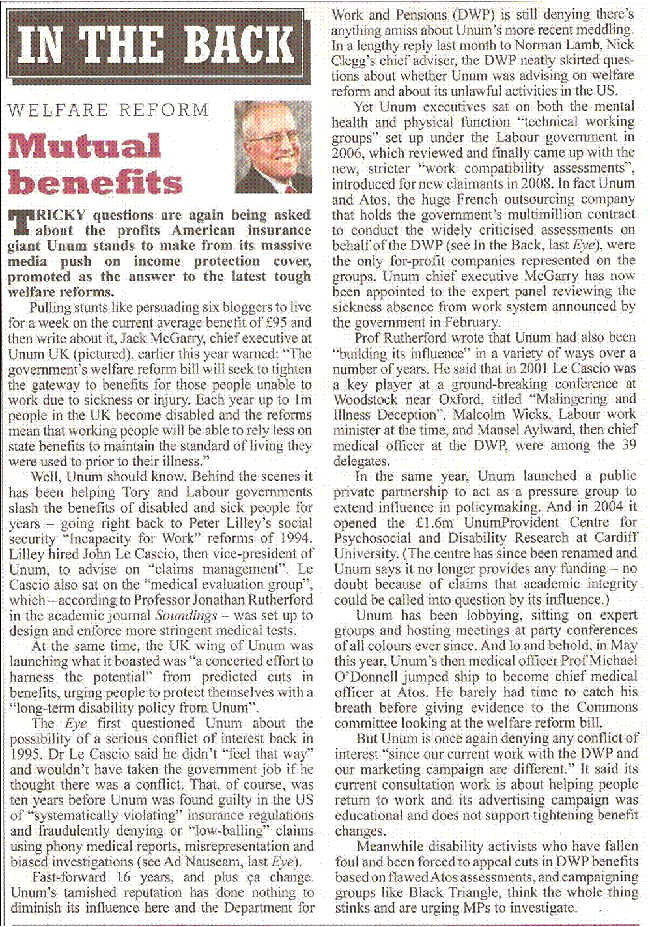
Private Eye, Issue 1302 November 11th 2011 - Page 28
A double standard is observable within the BPS lobby’s argument against the legitimacy of ‘symptom-defined illnesses’(such as IBS, stress and back conditions). The medical establishment is asserted to have allowed the growth of ‘syndromes’, which they construct as having less validity than ‘diseases’, counterpoised as having a solid pathological basis.
It is strongly ironic, then, that they do not hold psychology to the same criticism, since its epistemology is practically founded on the creation of labels around sets of observed behaviours.
Aylward and LoCascio treat us to a round-up of some of the terms that have proliferated in psychology around ‘medically unexplained symptoms’: “hypochondriasis”, “hysteria”, “functional overlay”, “somatisation”, “malingering”, “illness behaviour” etc” (Aylward and LoCascio, 1995,p.19) that they state has been to ‘confusing’ effect.
Though some might consider this inconsistency to be evidence of a flaw in that general theory, the authors’ motive in recounting this seems to be more in order to establish that there is something there to ‘psychologise’.
 Expectation might be that a balance would be attempted between this focus on the psychology of the individual and that most ‘social’ of all activities – work. This aspect of ‘the social’, though, is almost invisible in the lobby’s publications; work is relegated, or more accurately, elevated, to a distant idea which can be summarised in the simple statement: ‘Work is always good for you’. No further justification for this astonishingly sweeping generalisation is offered than a DWP commissioned ‘independent’ literature review co-authored by one of Aylward’s colleagues at Cardiff, Gordon Waddell (Waddell and Burton, 2006). Though the document contains ‘disclaimers’ which qualify that notion in acknowledgement that work can pose hazards to health for some people under certain circumstances, the overriding message is of the positive values inherent in work, and it seeks to make it strongest case in the linking of ill-health and unemployment, concluding that “Work is generally good for health and well-being”. A ‘pamphlet’ on ‘Work and Health’ by the same authors (Waddell and Burton, 2006b) counterpoise this idea against the constructed notion of ‘Common Health Problems’, this latter term, alongside ‘Medically Unexplained Symptoms’ assuming particular prominence in the BPS lobby’s literature.
Expectation might be that a balance would be attempted between this focus on the psychology of the individual and that most ‘social’ of all activities – work. This aspect of ‘the social’, though, is almost invisible in the lobby’s publications; work is relegated, or more accurately, elevated, to a distant idea which can be summarised in the simple statement: ‘Work is always good for you’. No further justification for this astonishingly sweeping generalisation is offered than a DWP commissioned ‘independent’ literature review co-authored by one of Aylward’s colleagues at Cardiff, Gordon Waddell (Waddell and Burton, 2006). Though the document contains ‘disclaimers’ which qualify that notion in acknowledgement that work can pose hazards to health for some people under certain circumstances, the overriding message is of the positive values inherent in work, and it seeks to make it strongest case in the linking of ill-health and unemployment, concluding that “Work is generally good for health and well-being”. A ‘pamphlet’ on ‘Work and Health’ by the same authors (Waddell and Burton, 2006b) counterpoise this idea against the constructed notion of ‘Common Health Problems’, this latter term, alongside ‘Medically Unexplained Symptoms’ assuming particular prominence in the BPS lobby’s literature.
The pamphlet, aimed at a very broad audience of “those who deal with health issues at work”, including lawyers, but excluding the worker himself, frames its subject in terms of the ‘problem’ of continuing rates of sickness absence which they assert mainly involve these ‘common health problems’ of musculoskeletal, cardio-respiratory and mental health disorders. The explicit message is that people hold ‘illogical’ beliefs about the causes of their illness, which in any case, contain characteristics experienced by the population as a whole (the majority of whom, it is to be assumed, continue to work regardless) and it seeks, as much of the lobby’s literature does, to break existing conceptual links between ill-health and work. This notion is given full sway within Waddell and Aylward’s ‘Models of Sickness and Disability’ (2010). It is a minimising of ill-health which constructs the majority of the sick and disabled community as ‘deficient’ in some way, through having an ‘abnormal’ perception of their health – an ideological construct which pervades the broad literature of this lobby – the ‘paradox’ being “that so many end up with long-term disability”. Perhaps aware of the perceivable bias in their approach the authors contend that though “there is usually no good medical explanation…we must not jump to the conclusion that it’s malingering.”

Mansel Aylward
This is not an inhibition that is demonstrated within a particular collaboration which brings together through contribution, but also in acknowledgements and references, many of the high profile individuals, such as Aylward and Waddell, who have been involved in directing the course of recent work-as-welfare policies for the sick and disabled (Rutherford, 2007), or have generally provided a major influence on official and public perceptions of certain illnesses. It is the ‘big book’ of ‘Malingering and Illness Deception’ (Halligan et al, 2003).
This is a volume which can only be described as remorselessly zealous in the pursuit of its topic, so heavily belaboured is the message that deception is rife among humans, and the sick are no exception. It marshals every possible argument, covering a span from history to neuroscience, drawing even upon child development theories and the vague, unproven proposition, via primate studies, that ‘feigning’ sickness may be embedded into our very evolution.
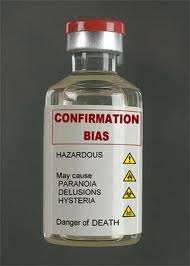 The treatment is so ‘thick’, the overall impression contributing to a sense of paranoia about deception around every corner, that, were it a human, one would expect it to be wearing a tinfoil hat. But, fear not, reassurance is on hand in the form of the closing section, which focuses on the progress made in ‘deception detection’ and the news that neuroscience may be on the verge of developing scanning technology with which to indentify lying activity in the brain.
The treatment is so ‘thick’, the overall impression contributing to a sense of paranoia about deception around every corner, that, were it a human, one would expect it to be wearing a tinfoil hat. But, fear not, reassurance is on hand in the form of the closing section, which focuses on the progress made in ‘deception detection’ and the news that neuroscience may be on the verge of developing scanning technology with which to indentify lying activity in the brain.
This publication seems to have been welcomed by the ‘psycho’ professions, with one reviewer from that field expressing delight at the way the book “gets off to a cracking start” (Fleminger, 2004), almost as if it was a bestselling thriller, rather than the purported exposition of a serious issue for the medical profession. Somewhat unseemly for a professional to express such glee at the fact that “many of our patients may be deceiving us, and that much of this deception may be conscious“. Fleminger particularly seems to relish Wessely’s “delightful tour of the history of malingering”, concluding that though the book is not likely to be of any help in detecting deceit, readers will have been “entertained and educated“. In this sense, considering the ostensibly serious tone of the book, perhaps there is an aspect of it, with respect to certain of its target readership, which is acting as a ‘dogwhistle’, encouraging and reinforcing scepticism, doubt and cynicism of professionals towards those in their care.
The BPS model is consistently deployed in the framing by this group, across the span of their publications, of an ‘illness deviance’, its principles drawn upon to emphasise the (flawed) ‘subjectivity’ of those suffering ill-health in a way which seeks to undermine their credibility, asserting that there has been a proliferation of ‘medically unexplained symptoms’, juxtaposed against the notion that the majority of health problems are ‘common’, and therefore experienced ‘commonly’ within everyday human experience by most people. This purpose could not be further from the intent of its originator who declared that “[M]any illnesses are largely subjective – at least until we as observers discover the parameters and framework within which we can also make objective observations. Hyperparathyroidism, in many of its manifestations, was a purely subjective experience for many patients until we discovered what to look for and which instruments to use in the search”. (Engel, 1961). Engel further sounds a cautionary note for those involved in the production of new knowledge: qualifying a definition of research as “to see what everyone else has seen and think what nobody else has thought” with a caution not to fall into the trap of thinking that the ‘new’ thought is necessarily any more correct. It is something perhaps that the BPS lobby might well have borne in mind considering the serious effects their ‘theories’ are now having on the lives of the sick and disabled 1.
One initial area of illness which has been exposed to the notion of the ‘medically unexplained’ is that of conditions of the lower back, symptomatically presenting as an individual’s subjective experiencing of pain, and therefore incapacity, in that region, without, it is asserted, any detectable underlying physical pathology. A leading figure from within the BPS lobby in this topic is Gordon Waddell, whose publications, notably his ‘Back Pain Revolution’ (2004), have become key sources in the referencing of ‘medically unexplained symptoms’. Revealingly, his work is referenced over fifty times within the aforementioned ‘Malingering’ book. Of note in this regard is Waddells’ attempt to distance his work, specifically his diagnostic tool, ‘Waddells’ Signs’, which has acquired a reputation for use in discrediting litigants in industrial negligence cases (Gelman and Brazin, 2000; Personal Injury News, 2008) from any notion that it intends to prove malingering. The fact that this disclaimer is reported within the book on malingering itself lends a certain irony to the situation.
Much of Waddell’s, and his colleagues’, literature centres, as discussed, around ‘medically unexplained symptoms’, and the assertion of no underlying physical pathology. Implicit within this perspective is a strangely unscientific notion that the existing state of medical knowledge/technology is the final word diagnostically, contrasting with Engel’s insight that medical science often needs to ‘catch up’ with subjective patient experience, through the development of new ‘instruments’. It is just such an occurrence which now casts doubt upon the dismissing of musculoskeletal disorders as lacking detectable pathology. Recent developments in medical technology (University of Aberdeen, 2000) have highlighted the limitations of conventional MRI in detecting the physical causes of musculoskeletal conditions, a category that takes centre stage among the BPS lobby’s ‘medically unexplained’ disorders. Under conventional, non-weight-bearing MRI “the conditions under which symptoms arise are often not reproduced” due to the patient lying down. (Group Health, 2010). New ‘weight-bearing’ i.e. upright MRI technology is proving to have a superior capacity in more accurately identifying the pathologies behind these conditions.
For all the BPS lobby’s assertion that theirs is a more explanatory model of illness their usage of BPS is very unbalanced in favour of its psychological (and therefore, individualised) roots, at the expense of the ‘social’. Yet it is in that sphere where a much more convincing argument for a cause in the rise in musculoskeletal disorders can be found, whether or not the technology yet exists to ‘detect’ them; that is in the changes that have occurred in work practices, conditions and environments, particularly for the low-waged.

http://www.vegansoapbox.com/slow-the-line/
Within Aylward et al’s conceptual framework the social practice of work is awarded an uncritically positive value (Waddell and Burton, 2006) as opposed to the immense range of activities that constitute it in the ‘real world’ (Dean, 2010), or the diversity of experiences a worker may encounter in the contemporary unequal spread of benefits across the ‘division of labour’. Supporting a competing notion of the effects of work on wellbeing the Cardiff and Oxford Universities based ESRC Centre on Skills, Knowledge and Organisational Performance (SKOPE) has conducted substantial research into ‘bad jobs’ (Payne, 2011). A volume of their findings on working conditions experienced across a range of low paid employment was published in the U.S (Lloyd et al, 2008) as part of a project to assess this sector of the working population across selected European countries and America.
A chapter on the food processing industry, which accounts for 13% of manufacturing in the UK, employing over 400,000 workers, offers a far more rational framework for the ‘unexplained’ rise in musculoskeletal disorders, than some perceived psychological defect which causes sufferers to ‘amplify’ or ‘magnify’ their symptoms. The researchers observed that in this sector “working conditions can be both extremely unpleasant (e.g. meat processing plants) as well as harmful to health and safety. Repetitive work routines that are physically demanding … can often result in injuries to the back, neck, hands and shoulders” adding that employees can be under pressure to “work long hours to make up their pay”, and that ‘gruelling’ ten hour shifts” (James and Lloyd, 2008) are common in this intensified work environment.
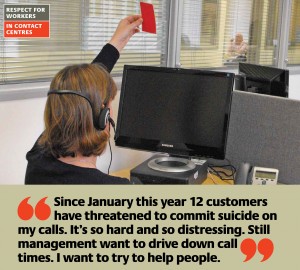 It is clearly evident within this and other accounts, both in the book and elsewhere (Acquiar and Herod, 2006), of the frequency with which low paid workers must submit to adverse conditions, that modern working practices and conditions are likely to have substantially contributed to the rise in so-called ‘common health problems’, with the high numbers of sufferers from these conditions completely consistent with the fact “there remains a significant number of low paid jobs (about 22% of the UK workforce) and in some instances the numbers are growing, particularly in parts of the service sector” (Lloyd et al, 2008). Consecutive chapters of the book deal with the negative implications for health of various types of low paid work, including that of hotels, retailing, hospitals, food processing and call centres.
It is clearly evident within this and other accounts, both in the book and elsewhere (Acquiar and Herod, 2006), of the frequency with which low paid workers must submit to adverse conditions, that modern working practices and conditions are likely to have substantially contributed to the rise in so-called ‘common health problems’, with the high numbers of sufferers from these conditions completely consistent with the fact “there remains a significant number of low paid jobs (about 22% of the UK workforce) and in some instances the numbers are growing, particularly in parts of the service sector” (Lloyd et al, 2008). Consecutive chapters of the book deal with the negative implications for health of various types of low paid work, including that of hotels, retailing, hospitals, food processing and call centres.
The strain of call centre work is described as being due to “the combination of high work pressure and limited autonomy”…which results in “high levels of stress…“, while the public hospital is revealed to be a place where “one in five assistant nurses and three in five cleaners are estimated to be paid below the low pay threshold”, a more convincing explanation for the rise in stress-related disorders than the BPS lobby’s ‘individualised’ concept that it arises from the ‘wrong attitude’, dismissing it as the “medicalisation of dissatisfaction”‘ (O’Donnell and Bevan, 2004). This latter term is contestable by the counter claim that there has been a ‘psychologising of work-related illness’, which process it has been the purpose of this article to highlight. The labelling game is not difficult to play, but it reveals little more than the bias of the writer, and their penchant for the ‘overarching phrase’. As journalistic investigations into low paid work, undertaken through participant observation (Ehrenreich, 2002; Toynbee, 2003; Pai, 2008) have revealed, it is more usually the case that low-paid workers are often extremely industrious, of necessity enduring harsh conditions that accompany what is regarded as low-skilled work. It is an image that is more consistent with a worker who ‘works till they drop’ than one who is deterred from working by the ‘subjective’ experience of ‘mild to moderate common health problems’ that other ‘normal’ workers are inclined to overlook.
 Selective use of data can provide a misleading impression, and there is a weakness inherent in the BPS lobby’s argument that a ‘paradox’ exists between, on the one hand, “improvements in healthcare and objective measures of health” that they assert proof that ‘everyone is getting healthier’ and on the other the ‘mysterious’ rise in long-term illness (Waddell and Aylward, 2010). Data has long been available to governments, and indeed has often been uncovered by their own commissioned research, on the differing effects of work on health according to occupation (Jones, 2001) and consequently the unequal distribution of health benefits with regard to work. Substantiating the existence of a “class-related health gradient”, evidence from government commissioned reports from 1980 and 1998 (Dept of Health and Social Security, 1980; Acheson, 1998), testifies to continuing, and increasingly marked, disparities in health between socio-economic classes differentiated by occupation. The difference in incidences of disease between those at the top of the occupation hierarchy and those at the bottom were shown to be significant, the likelihood of male professionals contracting a long-term illness between the ages of 44-64 stood at 17% while for those in the lowest group it was 48%.
Selective use of data can provide a misleading impression, and there is a weakness inherent in the BPS lobby’s argument that a ‘paradox’ exists between, on the one hand, “improvements in healthcare and objective measures of health” that they assert proof that ‘everyone is getting healthier’ and on the other the ‘mysterious’ rise in long-term illness (Waddell and Aylward, 2010). Data has long been available to governments, and indeed has often been uncovered by their own commissioned research, on the differing effects of work on health according to occupation (Jones, 2001) and consequently the unequal distribution of health benefits with regard to work. Substantiating the existence of a “class-related health gradient”, evidence from government commissioned reports from 1980 and 1998 (Dept of Health and Social Security, 1980; Acheson, 1998), testifies to continuing, and increasingly marked, disparities in health between socio-economic classes differentiated by occupation. The difference in incidences of disease between those at the top of the occupation hierarchy and those at the bottom were shown to be significant, the likelihood of male professionals contracting a long-term illness between the ages of 44-64 stood at 17% while for those in the lowest group it was 48%.
The falling death rate was also shown to favour the higher classes, with a greater number surviving until retirement age. This faster decline in mortality rates among the better off has continued with a widening of disparity between highest and lowest on the occupational scale. In the 1970s mortality was twice as high for men at the lowest end than at the highest, growing to three times higher by the beginning of this century. All the more surprising, then, to find the esteemed professor Aylward declaring in 2006 that though “some jobs are still poorly paid, toxic and unsafe…there are fewer of these jobs now than there were 20 years ago” (Brindley, 2006). This astonishing inversion of fact is all the more alarming considering Aylward’s extended career in government office since 1966; as chief adviser, medical director and chief scientist to the Department for Work and Pensions (Basini, 2004); one which surely must have brought him into frequent contact with these facts.
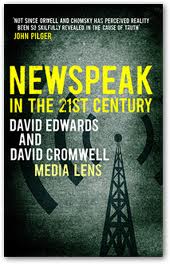
Abstract concepts, as Orwell stated (1946), can have many irreconcilable meanings, and consequently, he contends, the simplistic statements that contain them, such as ‘Work is always good for you’ are very rarely employed without the intent to deceive.
Within government discourse ‘Work’ features only abstractly, functioning as a ‘glittering generality’ in that it is vaguely, if at all, defined, and afforded only positive value. Abstract concepts, as Orwell stated (1946), can have many irreconcilable meanings, and consequently, he contends, the simplistic statements that contain them, such as ‘Work is always good for you’ are very rarely employed without the intent to deceive.
Despite the government’s reluctance, or, more accurately, refusal, to elaborate on their concept of work (Grayling, 2011), aside from ascribing to it a universally positive value, there is a very specific construction of it within official literature. Analysis of the level of ‘capabilities’ which government perceives as required to sustain a worker in employment reveal an astonishingly narrow conception of the modern workplace or of the conditions that workers are likely to encounter or need to withstand. In light of the foregoing evidence that a large sector of the workforce is compelled to work in conditions of excessive physical and mental strain it is incomprehensible to find such statements as: “Bending and Kneeling: This activity represents an unnecessary requirement for the workplace.” (DWP, 2009, p.19) This will certainly come as startling news to the veritable army of cleaners whose essential maintenance of hospitals, hotels, shops and offices, entails their employment in vast numbers, or indeed others in that ‘unskilled’ quarter of the workforce for whom bending, turning, kneeling, is not merely repetitive but intensively so. Similar examples abound in this literature, some having become notorious among the sick and disabled for their facile allusions towards what work involves, such as the ‘capability’ to “pick up a £1 coin with either hand” (DWP, 2009, p.22) which tiny activity, achievable even for amputees, is then submitted towards evidence that the claimant is ‘fit for work’.
 Among Atos’ training materials one specific document compares the roles of GPs/Clinicians against that required of their ‘Disability Analysts’ (Atos Origin, 2004). The GP’s described role is as would be expected, focusing on diagnosis and treatment and the formal use of their skills and knowledge, and stressing the ‘best interests’ of the patient. The literature is at great pains to emphasise the different standpoint which analysts (who are recruited from within the medical professions) must take towards their subject. It is made clear that their role is not to act as the patient’s advocate, but contrariwise, to submit them to surveillance, an activity which, by dictionary definition, carries with it connotations of suspicion. The Analyst is directed to take a very different attitude towards the patient, one which reveals a stark contrast in the way they are to be regarded and treated. The stated objective is assessing ‘functional’ capability/limitations with ‘objectivity’. The method described is one of close detailed scrutiny, attaching great importance to ‘informal observations’, and advising vigilance with respect to exposing ‘inconsistencies’ and “findings which do not indicate disease”. This approach is highly unlikely to produce the ‘objectivity’ to which it lays claim, in its biased focus on revealing ways in which the subject’s behaviour contradicts their assertions about their condition.
Among Atos’ training materials one specific document compares the roles of GPs/Clinicians against that required of their ‘Disability Analysts’ (Atos Origin, 2004). The GP’s described role is as would be expected, focusing on diagnosis and treatment and the formal use of their skills and knowledge, and stressing the ‘best interests’ of the patient. The literature is at great pains to emphasise the different standpoint which analysts (who are recruited from within the medical professions) must take towards their subject. It is made clear that their role is not to act as the patient’s advocate, but contrariwise, to submit them to surveillance, an activity which, by dictionary definition, carries with it connotations of suspicion. The Analyst is directed to take a very different attitude towards the patient, one which reveals a stark contrast in the way they are to be regarded and treated. The stated objective is assessing ‘functional’ capability/limitations with ‘objectivity’. The method described is one of close detailed scrutiny, attaching great importance to ‘informal observations’, and advising vigilance with respect to exposing ‘inconsistencies’ and “findings which do not indicate disease”. This approach is highly unlikely to produce the ‘objectivity’ to which it lays claim, in its biased focus on revealing ways in which the subject’s behaviour contradicts their assertions about their condition.
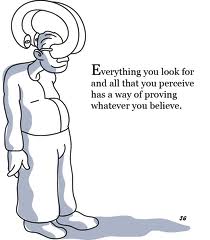 Similar evidence of the ‘loaded’ nature of instructions within the literature governing this process can be found on the government side, within the DWP’s ‘Training & Development ESA Handbook (2008). Blatant instructions are given to explicitly search for evidence which contradicts the claimant’s account. The discourse may be couched in the language of ‘objectivity’ but it is clearly evident what form that objectivity is expected to take, which is to minimise or play down the claimant’s incapacity.
Similar evidence of the ‘loaded’ nature of instructions within the literature governing this process can be found on the government side, within the DWP’s ‘Training & Development ESA Handbook (2008). Blatant instructions are given to explicitly search for evidence which contradicts the claimant’s account. The discourse may be couched in the language of ‘objectivity’ but it is clearly evident what form that objectivity is expected to take, which is to minimise or play down the claimant’s incapacity.
An illustrative sample can be found in this instruction from the Handbook: “Avoid making a statement such as “Can only walk 50 metres” as this may well be taken as fact by the Decision Maker or the Appeal Tribunal. Better would be; “Says he only walks 50 metres”, then give an example of what the claimant actually does, as far as walking is concerned, on an average day: “Walks to the shops and back (about 200 metres in all) but says he has to stop at least twice due to back pain”. (DWP, 2008, p.41). Here the claimant’s account is contradictorily afforded two opposing values at the same time; their own estimation when directly asked, and a competing one derived from ‘informal’ questioning about daily activities.
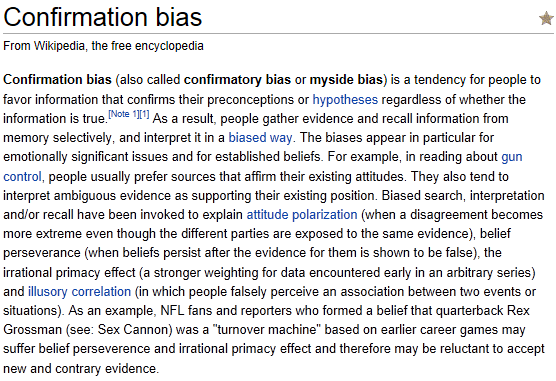
It is not only the patient/claimant who can be constructed as ‘deviant’ within this new BPS and government discourse. The traditionally sacrosanct medical authority of GPs is being undermined through suggestions that they may be prone to ‘collude’ with patients for a variety of reasons (Halligan et al, 2003b, p.19; Wessely, 2007). Advice targeting doctors charged with filling in forms for DLA/AA (Disability Living Allowance/Attendance Allowance) bears an uncanny resemblance to that embedded within the WCA and ESA regulations: “Are regular scripts being ordered?” introduces the idea that the patient can be ‘caught out’ if their medication intake is not consistent with their condition. Examples of suggested wording leave little ambiguity regarding which aspects of patient behaviour the health professional should focus on “eg rose unaided from a chair in the surgery, no bending difficulty.” (DWP, 2008b) The stubborn resistance of GPs who remain committed to a code of ethics (McCartney, 2011) which prioritises advocacy of the patient, provide something of an obstacle to the intended ‘paradigm shift’ envisaged by the lobby. Among materials aimed at removing this include those which caution them against making ‘false attributions’ of illness to work (Waddell, 2006c), or contend that “sick certification is a major therapeutic intervention“, and play on the idea of a benefits “culture” (with accompanying stereotypical cartoon), the latter form of construction as has been described, being frequently deployed to ‘blame the victim’. The shift that they seek to bring about in general practice is a transformation away from the notion that “Work is a risk, and potentially harmful” towards “Work is healthy, and therapeutic” (Waddell, 2006c).

Prof. Mike O'Donnell was Chief Medical Officer at Unum for 10 years before joining AtoS in the same role last year
A noteworthy feature of the BPS lobby is the opportunistic aspect of their methods, drawing alternately, and selectively, from the fields of medicine, sociology and psychology those elements which best suit their purpose. The authority historically bestowed upon bio-medicine is drawn upon to underpin the legitimacy of their point of view – they are ‘experts’- a presumption underscored by their frequent holding of titles such as ‘Chief Medical Officer’, whether in the public or private sector.
This is the full extent of bio-medicine’s usefulness to the lobby as, outside of that legitimising function, they are at pains to present it as an inferior ‘model’ of modern illness. Concepts from sociology such as ‘illness behaviour’ and ‘the sick role‘ are deployed to support the idea that there are ‘gains’ or ‘rewards’ associated with being ill. Conscious, no doubt, of the social unacceptability of the suggestion that all sick and disabled people are malingerers, there is then the attempt to construct a ‘softer’ variant of the illness deviant via psychology.
This individual is more by way of being an ‘accidental’ malingerer, subject to a form of self-deception, in which they harbour ‘irrational’ beliefs about their condition, and how it affects their ‘functioning’ or ‘capabilities’.

'This is not a pipe' Ergo DWP/AtoS 'Customers' are not disabled!
This deviant also holds similar mistaken attitudes towards work in that they make ‘false attributions’ towards it as the source of their illness or potential cause of further suffering, and fail to realise it is the only means by which they can heal. Once these have been posed as the ‘problem’ and ‘solution’, a process in which sufferers are invariably found ‘fit for work’ can justify a snatching away of the crutches of benefit support through a doublespeak discourse reframing such support as ‘abandonment’ and redefining this actual form of abandonment as ‘rescue’.
This peculiarly ‘messianic’ use of the concept of work, and the explicit bias of the WCA, with its excessive numbers of the sick ‘found fit’, has prompted some disabled activists to resort to parody, through an irreverent depiction of the ‘miracle cures’ of Atos (Atos Miracles; Holmey, 2011).
It is through a more sombre parallel, though, that the harmful and defamatory nature of the BPS lobby’s material can be exposed. Those activists who have adopted the symbol of the ‘Black Triangle’, with its connotations of a sick and disabled community that were vilified through their depiction as arbeitsscheu (work-shy), also remind us that a means by which that regime concealed their abuses was through an emphasis on the idea of the supposedly ‘liberating’ potential of work.
The most deplorable aspect of the dominance of this official discourse has been the way in which it works to conceal the real nature of sickness and disability, and the hard work that sufferers must already do to bridge the gap between their impairments and an involvement in everyday life which the able-bodied take for granted. But it is a discourse, hopefully, whose days are numbered as increasing numbers of that community ‘find their voice’ (Marsh, S; Campbell et al, 2012) and assemble themselves around a counter narrative which promises to shatter the grievously false image which has been imposed upon them.
References
Acheson, D. (1998) Independent Inquiry into Inequalities in Health. London: The Stationary Office.
After Atos (2011) ‘After Atos Assessment: Website and Feedback Survey Dedicated to All Those Taking the Atos Medical Assessments.’ Available at: http://www.afteratos.com/ (Accessed: 23 December 2011).
Aquiar, L.M and Herod, A. (2006) The Dirty Work of Neoliberalism. Oxford: Blackwell Publishing.
Atos Origin (2004) ‘Guidance for Examining Medical Practitioners’. London: Atos Origin UK Ltd.
Atos Miracles (2011) Available at: http://www.atosmiracles.info/ (Accessed: 05 January 2012).
Aylward, M. and LoCascio, J.J.(1995)’Problems in the assessment of psychosomatic conditions in Social Security benefits and related commercial schemes’. Journal of Psychosomatic Research, 39(6).
Barnes, M. C., Buck, R., Williams, G., Webb, K. and Aylward, M. (2008) ‘Beliefs About Common Health Problems and Work: A Qualitative Study’. Social Science and Medicine, 67(4). Abstract available at: http://www.ncbi.nlm.nih.gov/pubmed/18556100 (Accessed 27 December 2011).
Basini, M. (2004) Western Mail, Cardiff, 12 July.
BBC News (2011) Grayling quoted in ‘Benefit applicants – ’75% fit to work or drop claims’. BBC News [online] Available at: http://www.bbc.co.uk/news/uk-politics-13217824 (Accessed: 30 December 2011).
benefitsclaimantsfightback. (2011) ‘Atos Origin Protests Across the UK – full round up’. Available at: http://benefitclaimantsfightback.wordpress.com/2011/05/15/atos-origin-protests-across-the-uk-full-round-up/ (Accessed: 05 January 2012).
Black Triangle (2011) Black Triangle – Anti-Defamation Campaign in Defence of Disabled Claimants. Available at: http://blacktriangle1.blogspot.com/ (Accessed: 23 December 2011).
Borrell-Carrió, F., Suchman. A. L., and Epstein, R. M. (2004) ‘The Biopsychosocial Model 25 Years Later: Principles, Practice, and Scientific Inquiry’. Annals of Family Medicine, 2 (6).
Brindley, M. (2006) ‘Boring, hard and a chore but work makes us happy’.Western Mail, Cardiff. 15 September.
Campbell, S. J., Anon, ME., Marsh, S., Franklin, K., Gaffney, D., Anon., Dixon, M., James, L., Barnett-Cormack, S., Fon-James, R., Willis, D. and Anon (2012) ‘Responsible Reform: A Report on the proposed changes to Disability Living Allowance’(The Spartacus Report). Available at: http://www.ekklesia.co.uk/files/response_to_proposed_dla_reforms.pdf (Accessed: 10 January 2012).
Dean, H. (2010) ‘From work to welfare?: reconstructing the liberal political discourse.’ In: Social Policy Association Annual Conference, Social policy in times of change, 5-7 July, University of Lincoln. Available at: http://www.social-policy.org.uk/lincoln/Dean.pdf (Accessed: 05 January 2012).
Dept of Health and Social Security (1980) Report of the Working Group on Inequalities in Health (The Black Report). London: HMSO.
DWP (2008) ‘Training and Development ESA Handbook’. Office of the Chief Medical Adviser, Department for Work and Pensions.
DWP (2008b) ‘Advice to GPs completing DLA and AA factual reports’. Available at: http://www.dwp.gov.uk/docs/dla-aa-1pp-factual.pdf (Accessed: 22 December 2011).
DWP (2009) ‘Work Capability Assessment Internal Review’. Department for Work and Pensions. Available at: http://www.dwp.gov.uk/docs/work-capability-assessment-review.pdf (Accessed: 20 December 2011).
Ehrenreich, B. (2002) Nickel and Dimed: Undercover in Low-Wage USA. London: Granta.
Engel, G. L. (1961) ‘Is Grief A Disease?: A Challenge for Medical Research. Psychosomatic Medicine, 23(1) pp.18-22.
Gelman, J. L. and Brazin, M. E. (2000) ‘The Use Of Waddell Tests In Workers Compensation Claims’. The Chiropractic Resource Organization. Available at: http://www.chiro.org/LINKS/FULL/Wadell_Tests.shtml (Accessed: 20 December 2011).
Gentleman, A. (2011) ‘New disability test ‘is a complete mess’ says expert’. The Guardian. Available at:
http://www.guardian.co.uk/politics/2011/feb/22/new-disability-test-is-a-complete-mess. (Accessed: 05 January 2012).
Grayling, C. (2011) ‘Migration to Employment and Support Allowance’. Work and Pensions Select Committee Meeting, 8th June (transcript). Available at:http://www.publications.parliament.uk/pa/cm201012/cmselect/cmworpen/uc1015-iii/uc101501.htm (Accessed: 23 December 2011).
Group Health (2010) ‘Clinical Review Criteria: Weight-Bearing MRI’. Group Health. Available at: http://www.ghc.org/all-sites/clinical/criteria/pdf/mri_weight_bearing.pdf;jsessionid=ZFGMRPIUB1KILJCISQ3SHPQ (Accessed: 28 December 2011).
Halligan, P. W., Bass, C. and Oakley, D. A. (2003) (eds) Malingering and Illness Deception. Oxford: Oxford University Press.
Halligan, P. W., Bass. C. and Oakley, D. A. (2003b) ‘Wilful deception as illness behaviour’,
in Halligan, P. W., Bass, C. and Oakley, D. A. (eds) Malingering and Illness Deception. Oxford: Oxford University Press.
Hampton, J. R. (2002) ‘Evidence-based medicine, opinion-based medicine, and real-world medicine’. Perspectives In Biology and Medicine,. 45(4).
Harrington, M. (2010) ‘An Independent Review of the Work Capability Assessment’. London: the Stationery Office. Also available at: http://www.dwp.gov.uk/docs/wca-review-2010.pdf (Accessed: 20 December 2011).
Harvey, D. L. and Reed, M. H. (1996) ‘The Culture of Poverty: An Ideological Analysis’. Sociological Perspectives, 39 (4) pp.465-495.
HOC (2011) ‘Migration to Employment and Support Allowance’. [streaming video]. Houses of Parliament. Available at: http://www.parliamentlive.tv/Main/Player.aspx?meetingId=8433 (Accessed: 03 January 2012).
Holmey (2011) ‘Atos Miracles, Report Your Miracles HERE’. Black Triangle Campaign. Available at:
https://blacktrianglecampaign.org/2011/08/18/atos-miracles-report-miracles/ (Accessed: 05 January 2012).
Independent Resource Centre, Clydebank (2011) ‘Written evidence’. Houses of Parliament. Available at: http://www.publications.parliament.uk/pa/cm201012/cmselect/cmworpen/1015/1015vw59.htm (Accessed: 03 January 2012).
James, S. and Lloyd, C. (2008) ‘Supply chain Pressures and Migrant Workers: Deteriorating Job Quality in the United Kingdom Food-Processing Industry’ in Lloyd, C., Mason, G. And Mayhew, K. (2008) (eds) Low-Wage Work in The United Kingdom. New York: The Russell Sage Foundation.
Jones, H. (2001) in May, M., Page, R. and Brunsdon, E. (eds) Understanding Social Problems. Oxford: Blackwell Publishing.
Lewis, O. (1969). ‘Culture of Poverty’. In Moynihan, Daniel P., On Understanding Poverty: Perspectives from the Social Sciences. New York: Basic Books.
Lloyd, C., Mason, G. And Mayhew, K. (2008) (eds) Low-Wage Work in The United Kingdom. New York: The Russell Sage Foundation.
Marsh, S. (2012) ‘Spartacus Report – Day 2′. Diary of a Benefit Scrounger. Available at: http://diaryofabenefitscrounger.blogspot.com/2012/01/spartacus-report-day-2.html (Accessed: 10 January 2012).
McCartney, M. (2011) ‘Well Enough To Work?’. British Medical Journal, 342. Available online at: http://www.bmj.com/content/342/bmj.d599.full.html?ijkey=1MHG4NxT0uJX4Lq&keytype=ref (Accessed: 20 December 2011).
O’Donnell, M. and Bevan, S. (2004) ‘Stress at Work: Time for a rethink?’, Occupational Health At Work, 1(3). Available at: http://www.theworkfoundation.com/Assets/Docs/stress.pdf (Accessed: 05 January 2012).
Orwell, G. (1946) ‘Politics and the English Language’. Available at: http://mla.stanford.edu/Politics_&_English_language.pdf (Accessed: 28 December 2011).
Pai, Hsiao-Hung (2008) Chinese Whispers: The True Story Behind Britain’s Hidden Army Of Labour. London: Penguin.
Payne, J. (2011) ‘United Kingdom: Recent Developments in Work Organisation in the EU Member States and Norway.’ European Working Conditions Observatory. Available at: http://www.eurofound.europa.eu/ewco/studies/tn1102013s/uk1102019q.htm (Accessed: 22 December 2011).
Personal Injury News (1999) ‘Waddell Twaddle’. Personal Injury News, 4(6), Electronic Handbook of Legal Medicine for Personal Injury and Medical Malpractice Lawyers. Available at: http://www.medlit.net/member/personalnews/vol4iss6/waddle.htm (Accessed: 20 December 2011).
Royston, S. (2010) ‘Not Working: CAB Evidence on the ESA Work Capability Assessment’. London: Citizens Advice Bureau.
Rutherford, J. (2007) ‘New Labour, the market state, and the end of welfare’. Soundings. Available at:http://www.lwbooks.co.uk/journals/articles/rutherford07.html (Accessed: 20 December 2011).
Science Daily (2008) ‘Biopsychosocial Model Thirty Years Later’. Available at: http://www.sciencedaily.com/releases/2008/01/080121115422.htm (Accessed: 30 December 2011).
Toynbee, P. (2003) Hard Work: Life in Low-Pay Britain. London: Bloomsbury.
University of Aberdeen (2000) ‘Major UK and US funding help University of Aberdeen scientists devise novel way to tackle causes of back pain’. University of Aberdeen. Available at: http://www.abdn.ac.uk/~wox004/archive/2000/pr639.hti (Accessed: 28 December 2011).
Waddell, G. (2004) The Back Pain Revolution. Churchill Livingstone.
Waddell, G. And Burton, K. (2006) ‘Is Work Good For Your Health and Well-Being?’London: The Stationery Office.
Waddell, G. and Burton, K. (2006b) Work and Health: Changing How We Think About Common Health Problems’. London:The Stationery Office. Also available at: http://www.kendallburton.com/Library/Resources/Work%26Health.pdf (Accessed: 28 December 2011).
Waddell, (2006c) ‘Health, work & well-being’ [Powerpoint presentation], Centre for Psychosocial & Disability Research, Cardiff. Available at: http://www.cardiff.ac.uk/cwerc/events/seminar1/Gordon%20Waddell.ppt (Accessed: 23 December 2011).
Waddell, G. and Aylward, M. (2010) Models of Sickness and Disability: Applied to Common Health Problems. London: The Royal Society of Medicine Press Ltd.
Wessely, S. (2007) ‘Why and When do Doctors Collude with their Patients?’, in O’Donnell, M. Mind Over Matter: Exploring the issues of Mental Health. Unum Chief Medical Officer’s Report 2007.
Notes
1 Accounts of deaths and suicides directly connected to Atos Assessments:
Scotsman (2010) ‘Author’s suicide ‘due to slash in benefits’. The Scotsman, 23 July. Available at: http://www.scotsman.com/news/author_s_suicide_due_to_slash_in_benefits_1_1367963
Black Triangle Campaign ‘Calums List – NOW 17 DWP “Welfare Reform & Unemployment Deaths”. Available at: https://blacktrianglecampaign.org/forum/?mingleforumaction=viewtopic&t=10.0#postid-21
Anderson, G. (2011a) ‘Stress of Tory benefits killed our dad, family claims’. Sunday Mirror. Available at: http://www.mirror.co.uk/news/top-stories/2011/05/22/stress-of-tory-benefits-tests-killed-our-dad-family-claims-115875-23147158/
Gentleman, A. (2011b) ‘Atos case study: Larry Newman. The Guardian, 24 July. Available at: http://www.guardian.co.uk/society/2011/jul/24/atos-case-study-larry-newman.
Gentleman, A. (2011c) ‘The medical was an absolute joke’. The Guardian, 23 February. Available at: http://www.guardian.co.uk/politics/2011/feb/23/government-reform-disability-benefits
WhyWaitForever (2011) ‘DWP ESA Medical Examinations’. Available at: http://www.whywaitforever.com/dwpatos.html
(All Accessed: 04 January 2012).
2 The ‘friending’ system of social networking has facilitated the growth of groups which are accumulating condemning evidence against the WCA. Numerous dedicated blogs and forums testify to the considerable, and increasing, need it has created among the sick and disabled for support and advice. A corresponding amount of ‘real-world’ activity is also occurring as sick and disabled people have ‘taken to the streets’ to try and highlight the adverse effects of the benefit changes (benefitsclaimantsfightback, 2011), though these actions are seldom reported in the mainstream media. All in all a substantial social movement is taking shape, whose participants are, understandably, aggrieved and outraged at the government’s actions.
Reports by charities, and advocacy groups, including the Citizens Advice Bureau (Royston, 2011), those representing specific conditions, and regional organisations testify to widespread suffering of the sick and disabled who have been wrongly assessed as able to work. Some agencies have been overwhelmed by the volume of people seeking aid and requesting representation at tribunals (Independent Resource Centre, 2011), leaving some people with nowhere to turn for help. The WCA also drew strong criticism from the Work and Pensions Select Committee (HOC, 2011), where many of its systemic flaws were highlighted, and from Professor Paul Gregg, one of the architects of the new welfare system, who has called it “badly malfunctioning” and “a complete mess”



9 Responses
The whole ethic surrounding the WCA, noteworthy being ATOS disgraceful handbook notes, their undermining of those far more capable and knowledgeable than themselves, and the shameful treatment of genuinely sick and vulnerable people, along with the obvious collusion of the extreme right wing government we have, is a a very clear indicator of the real purpose of this test and its outcomes. These are clearly stated and the parallels with 1930s Germany are not imaginary. The desire to paint claimants as workshy and that work (normally for large corporations in mundane jobs on workfare ) will make them free in mind and body, is a Nazi model and has nothing to do with any of the complex writings paid for and designed to support the abuse of the vulnerable (anybody who calls themselves a professor and writes for UNUM is simply a purveyor of propaganda, a little like Josef Goebbels ) and use them to obtain free work for no cost and once the stress and pressure cause them to become worse and heaven forbid take their own lives , well who cares? This government certainly do not. People forget the rise of Nazism did not happen over night, is was carefully prepared through propaganda, scapegoating and playing on the fears of the ignorant and self righteous. Tragically we are seeing an attempt to revive this in 21st century Britain . But this time we are prepared, we know are history, and we know the models and methods used to create the utmost suffering for the disabled and vulnerable. One thing can be gleaned without hesitation from this, that never in the field of government since the inception of democracy, has one government done its best to undermine, devalue, and ultimately destroy the lives of those whom are often not capable of withstanding their bullying and evil ways. You will here of their call to attend churches, to do the right thing, and their constant use of the word ‘moral’.
The truth is they know not the meaning of truth, their idea of the right thing is to destory those whom they hate, and their idea of ‘moral’ is to carry out their ideological extermination programs with no feeling or concern. Both they and their lapdogs in this ATOS are guilty of crimes that defy words, and in a later time both will be held accountable.
But the bottom line is those who order and demand these things fit the genuine description of physcopath , and i am not afraid to say the behaviour of members of this Government fit that description perfectly. For it is they who should attend a WCA, for they are clearly unwell and in fact should be subject to some kind of order, as they are not only a danger to themselves as they descend into further madness, but a real and present danger to society in general, and what we see before our very eyes is ample evidence of this.
an exellent summation – and a warning to all of the damage these “mind meddlers ” can do with their “psychobable ” , once again we see the serried ranks of “experts” ,few if any of whom have the slightest hint of disability or illness and thus NO practical experiance of it , pontificating on the nature of the mindset of the disabled and sick
like much of the “psycho” professions – there is little or NO real evidence for their assersions – just theories – propagated by the need for these people to retain and expand both their “professional ” influence and of course income stream with research grants et al
and here in lies the root cause of or problems “experts ” chasing the ££££££’s be it politicos , who we KNOW from events are not beyond feathering their own nests at the expence of the general poulation – or of these supposed experts – driven by the need to justify their existance in what many consider a “cinderella ” feild of medical “knowlage ” – that is fuled by the constant need to obtain funding to continue their “work ”
as i have opined elsewhere and before one must always look for the MOTIVE behind anything that is foisted on the people by those in “authority ” – and that motive 99 times out of 100 is money !! – usually them not wishing to share resources ( vis OUR money ) with others – and using pesudo “science ” to aid them in what they consider a worthy cause , that of being the moral guardians of the country and in this case , ensuring all us faking scroungers out here – get their’s – or NOT in this case
and yet these same “guardians ” in their ivory towers and unvercities – have little or NO concept of the lot of the ordenary working people , having gone from mothers teat , to nanny , to private schools ,univercity , and into well paid non jobs – ask yourself this : how many of THEM have ever done ANY hard physical labour week in week out ?? – again the answer is few if ANY ,and yet they have the gaul to pronounce of the deliterious effects of years of such by honest folk ??
but does the government employ ANY persons WITH direct experiance of the world of REAL work – of REAL disability and pain ?? – the answer is of course NO , as they would not like the answers they got – and its far simpler to have tame “experts” to forward their vindictive campaigns – after all the old addage of “he who pays the piper – calls the tune ” – is still as relevent to day as ever
YOU CAN GET ANY ANSWER YOU WANT TO ANY QUESTION IF YOU PAY THE RELEVENT “EXPERTS ” ENOUGH
but i must be careful – as other wise said experts will brand me a dangerously deluded individual with paranoid socio anti authority tendencies and have me locked away
RIBBLE – RIBBLE – RIBBLE ( the body may be screwed – but the old grey matter can still spot BS a mile off – espesially from supposed experts ) .lol
with all this money payed to their mates and firms who manage the sick and disabled and the unemployed would keep them all going with money saved but like labour give it away to their mates making us starve and die whilst they eat their food in piece we starve miss meals daily as ones benefits cut who do they think they are without us they be out of a job but they dont smarting up they can go and doesnt look like as they all seem more of the same ,jeff3
Neofascism. A worry sign during a recession in a heartless culture that judges the worth of a human as an ‘economic unit’. How much ‘wealth’ (only in £££s in certain circles) is each person ‘generating’. The noble and good judge differently. Good qualities: love, joy, peace, patience, kindness, goodness, faithfulness, gentleness, self-control (controlling one’s selfish urges, that is). Vices: pride, wrath, envy, lust, greed, gluttony, sloth. Among those who dare to set themselves above us to run the show, I see far more evidence of the latter than of the former.
A wonderfully thorough piece which exposes what I and countless others have suspected: that the Government is engaged in a type of Orwellian 1984 crusade of doublethink and double speak with statements such as “abandoned to a lifetime of sickness benefits” and an abuse of theories and rhetoric around inclusivity and equality. As all of you above have expounded so well above I need say no more except to say to the government: We see through you. We know what you are doing. We understand the background. But understand this: people, us, the disabled and our carers and families who are fighting for our very survival are gathering together. We are well-informed. We are determined. We will oust you. YOU SHALL NOT PASS.
The best researched and comprehensive blog I have read in some time. Very good indeed.
I trust it lands in the laps of those who have a political mandate driven by true democracy.
The influence of big business and the global economy which thrives upon driving people into the ground, working fourteen hour days, six days a week in mindless, repetetive tasks for scarecly enough to exist, is going to be a tough advisary.
How do we change the world and reclaim the intellectual critical mass, from those brought up on popular media propoganda and perceptional paralysis beyond the concept of, “I’m all right Jack?”
How do we fight a media that demonizes, openly, the sick, elderly & disabled?
The current news blackouts regarding the events in various parts of Europe, the riots and demonstrations, which are feared by everyone but are erupting because of this political agenda for Austerity.
I read a book called defying Hitler, a diary by Sebastian Hafner, written before the war and the rise of Nazi tyrany.
If you havn’t read it, I strongly reccomend it over 50 shades of Grey.
The sub-text is simple, bullies and ignorant bullies at that, are often psychopaths, hell bent on pursuing an agenda in their heads, which forms the nucleaus of a false reality, through propaganda.
Atos and the current political agenda is based upon a false agenda that we cannot have something for nothing and we must all go without.
When clearly, not all of us are.
As the wealthy are holding all the cards, how do we get them to part with that money and play fairly?
How do we increase the value of Human life beyond it’s capacity to produce an output?
How do we care for one another whilst we can, so we may enjoy a meaningful life when we can no longer work, for whatever reason?
How can we shift the focus from “Arbeit Macht Frei” to a fair days work, for a fair days pay?
God help us all…
Insightful article and one with which I am familiar. There is no doubt that the whole process that this and the previous government are embarking on is FASCISM.
It is endemic in all that they do, the ascribing of lower values to the poor, the ill, the unemployed, the unskilled, the homeless ,indeed most of the population at the same time as their own reification – FASCISM
If the uk is not careful it will be too late to reclaim what is OURS not THEIRS
In psychological terms, the government Ministers are engaged in a well known defence mechanism termed “projection” whereby their own failings, being too unpalatable to bear are projected out onto other people who they then believe are guilty of those very failings- e.g. they can’t bear it that they are over privileged gold-plated scroungers so they “see” this in the poor and disadvantaged and attack them instead of reflecting on and facing their own problems. Some are clearly psychopaths. I think both of these things are going on. A truly deadly and common mix in the powerful.
Does anyone remember a 4-part tv documentary called “The Nazi’s, a warning from history”? It would be appropriate for it to be re-run, the insights it contains are salient for our position today.
Anonymous, I shall look up “Defying Hitler” and try to get hold of a copy.
I believe we need to act urgently to get rid of this malignant Government before it is too late and our hard won rights are dissolved completely. Its later than we think….
In psychological terms, the government Ministers are engaged in a well known defence mechanism termed “projection” whereby their own failings, being too unpalatable to bear are projected out onto other people who they then believe are guilty of those very failings- e.g. they can’t bear it that they are over privileged gold-plated scroungers so they “see” this in the poor and disadvantaged and attack them instead of reflecting on and facing their own problems. Some are clearly psychopaths. I think both of these things are going on. A truly deadly and common mix in the powerful.
Does anyone remember a 4-part tv documentary called “The Nazis, a warning from history”? It would be appropriate for it to be re-run, the insights it contains are salient for our position today.
Anonymous, I shall look up “Defying Hitler” and try to get hold of a copy.
I believe we need to act urgently to get rid of this malignant Government before it is too late and our hard won rights are dissolved completely. Its later than we think….